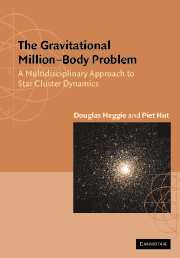Book contents
- Frontmatter
- Contents
- Preface
- PART I INTRODUCTIONS
- PART II THE CONTINUUM LIMIT: N → ∞
- PART III MEAN FIELD DYNAMICS: N = 106
- PART IV MICROPHYSICS: N = 2
- PART V GRAVOTHERMODYNAMICS: N = 106
- 16 Escape and Mass Segregation
- 17 Gravothermal Instability
- 18 Core Collapse Rate for Star Clusters
- PART VI GRAVITATIONAL SCATTERING: N = 3
- PART VII PRIMORDIAL BINARIES: N = 4
- PART VIII POST-COLLAPSE EVOLUTION: N = 106
- PART IX STAR CLUSTER ECOLOGY
- Appendix A A Simple N-Body Integrator
- Appendix B Hints to Solution of Problems
- References
- Index
17 - Gravothermal Instability
Published online by Cambridge University Press: 05 June 2012
- Frontmatter
- Contents
- Preface
- PART I INTRODUCTIONS
- PART II THE CONTINUUM LIMIT: N → ∞
- PART III MEAN FIELD DYNAMICS: N = 106
- PART IV MICROPHYSICS: N = 2
- PART V GRAVOTHERMODYNAMICS: N = 106
- 16 Escape and Mass Segregation
- 17 Gravothermal Instability
- 18 Core Collapse Rate for Star Clusters
- PART VI GRAVITATIONAL SCATTERING: N = 3
- PART VII PRIMORDIAL BINARIES: N = 4
- PART VIII POST-COLLAPSE EVOLUTION: N = 106
- PART IX STAR CLUSTER ECOLOGY
- Appendix A A Simple N-Body Integrator
- Appendix B Hints to Solution of Problems
- References
- Index
Summary
Can a million-body system be in equilibrium? More precisely, can a model of a million-body system exhibit equilibrium? The answer depends on the model and other conditions. But we already saw in Chapter 8 that equilibrium models of gravitational many-body systems can be constructed. Thus, if it is modelled as a self-gravitating perfect gas it will be in thermal equilibrium if its temperature is uniform. If it is modelled by a Fokker–Planck or Boltzmann equation, then the equivalent condition is that the single-particle distribution be Maxwellian. In both cases the system is required to have infinite mass and extent.
These isothermal models are, in a strict sense, artificial, but they are of great importance conceptually, and for other reasons. In order to make progress in understanding them we shall replace one form of artificiality with another. Instead of dealing with infinite systems, we shall enclose our isothermal system in a spherical enclosure, which at least has the merit of implying that our systems have finite mass and radius. We shall suppose that the enclosure is rigid and spherical; in the N-body model this means that stars bounce off it without loss of energy, while in the gas or phase-space models, it implies that the enclosure is adiabatic. We assume spherical symmetry, and that stars all have the same fixed individual mass. We work entirely, however, with a perfect gas model.
- Type
- Chapter
- Information
- The Gravitational Million–Body ProblemA Multidisciplinary Approach to Star Cluster Dynamics, pp. 164 - 171Publisher: Cambridge University PressPrint publication year: 2003



